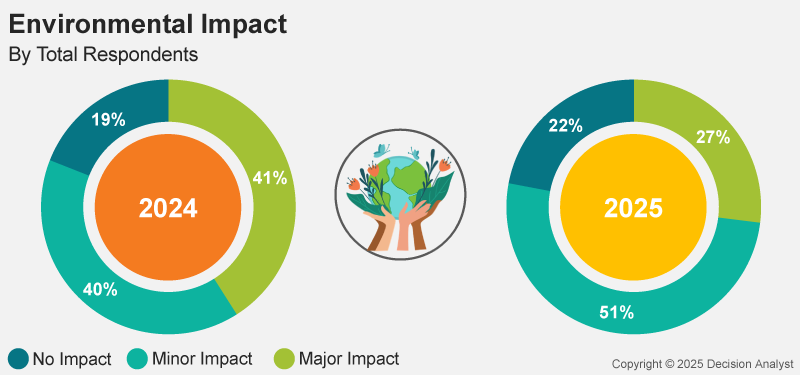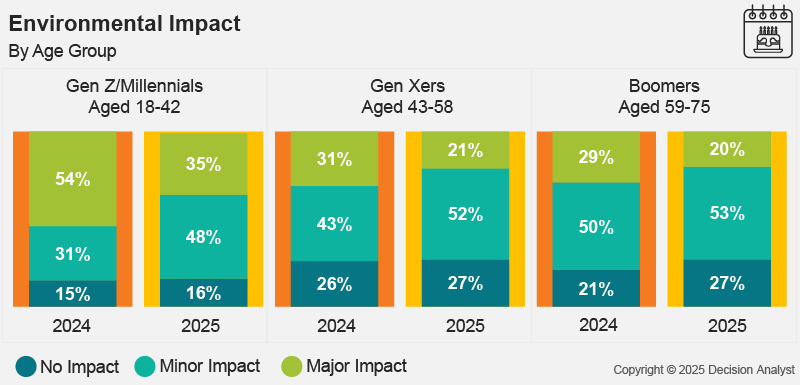Consumer Priorities: Sustainability Takes a Backseat
(For Now)
We've observed a notable shift in consumer priorities. Amidst inflation, unemployment, general economic uncertainty, and evolving public policies, the influence of product sustainability and environmental impact on purchasing decisions has softened over the past year.*
This doesn't indicate a complete disregard for these issues; rather, consumers are being compelled to make tradeoffs, suggesting manufacturers may need to dial back costly investments in these areas for a while. It will be interesting to see how shoppers’ decisions are impacted as economic conditions change. Over one-quarter of U.S. adults still report that environmental friendliness has a major impact on their product choices, even in the current economy.
In March 2024 and again in March 2025, Decision Analyst surveyed several hundred consumers regarding their choices based on a product's "impact on the environment" and its perceived "sustainability." While these remain important considerations, it's clear that consumer priorities have recently changed.

The shift in focus on eco-friendliness is dramatic. Among all U.S. adults aged 18 to 75, “impact on the environment” softened appreciably between 2024 and 2025 when it comes to choosing products to buy. While just over a fourth of consumers say this factor has a major impact on their decisions in 2025, more than 4 in 10 said the same just one year prior (a 14-percentage point decrease). The change in influence of “sustainable” was similar.
Is this movement across the board or concentrated among certain groups?
The strongest changes noted are among younger consumers (aged 18 to 42). Given that younger adults have stereotypically driven much of the sustainability movement, their sizable shifts in behavior are impacting the overall story.
While the strength of influence of “impact on the environment” on product choices has softened among all age groups, the drop is much more substantial among the combined “Gen Z/Millennial” group in our data (18- to 42-year-olds). It’s also worth noting the rise in no impact among the oldest consumers (aged 59 to 75).

Let’s dig a little deeper
Our research asked questions twice: once using the phrase “impact on the environment” and separately using the word “sustainability.” While there were no notable differences at a high level, consumers reacted differently when thinking about product categories. Here’s an important, and the most extreme, example of the differences: food and beverage purchases.

In 2025, it seems the notion of foods and beverages being sustainable is somewhat more influential than having an impact on the environment (27% versus 23% “major impact”). And the drop in impact on purchase decisions over the 12-month period was much less pronounced for sustainability than for impact on the environment. There are messaging implications here. Although both claims are less powerful now compared to a year ago, “sustainable” is the more compelling of the two claims for food and beverages, should brands wish to leverage this idea.
While all categories shifted, other notable changes (down 8 percentage points or more) include:
- Sustainability of clothing, cleaning products, accessories, and personal care products.
- Impact on the environment of accessories, paper products, and personal care products.
As mentioned, this softening in attitudes is likely tied, at least in part, to the challenging economy. This research has also shown us over the past few years that inflation has taken a major toll on household spending. Consumers have chosen to first cut back on food spending (both groceries and dining out), followed by clothing, entertainment, household goods, and travel.
There are no doubts that economic conditions are impacting consumer sentiment, attitudes, and behaviors. We will continue watching and reporting the trends. If you have questions, we would be happy to talk.
*Respondents were presented with the question, “There are many factors that influence someone to buy a specific product, including past experience, quality, and price. This survey is asking about some other factors that could influence your interest in buying specific products for yourself and your household, assuming the products were high quality and the price like other products.” A series of questions using the phrases "impact on the environment" and "sustainability" was asked to determine how these two ideas impact purchase decisions.
Methodology
Since 2020, Decision Analyst has conducted periodic consumer tracking to measure consumer sentiment, attitudes, and behaviors. The online survey is conducted among a sample of U.S. households balanced by gender, age, and geography. This research was conducted in two waves, as follows:
- 2024: data collected from April 10 to April 17, 2024. Base size: n=908
- 2025: data collected from April 2 to April 7, 2025. Base size: n=534
These environmentally focused questions were randomized across respondents to avoid order bias. That is, half of the respondents were shown “sustainability” questions first, and the other half were shown “impact on the environment” questions first.
To learn more, contact Bonnie Janzen, President, at bjanzen@decisionanalyst.com or Felicia Rogers, Corporate Executive Vice President, at frogers@decisionanalyst.com.
Authors
Bonnie Janzen
President
She drives growth for client companies by leveraging strategic consumer insights, innovation, and analytics to shape impactful marketing campaigns and new product development programs. Her consulting expertise includes guiding clients through new business concepts, mergers and acquisitions, including global expansion. She is particularly passionate about advertising and messaging research and plays a key role in the company's strategic direction.
Felicia Rogers
Corporate Executive Vice President
Felicia serves as a strategic advisor to clients and internal teams and works closely with our research teams to address clients’ tough business questions and challenges. During her career, Felicia has partnered with companies across an array of categories. She enjoys supporting clients in their efforts to build strong brands, accelerate new product development, and optimize the customer experience. Felicia began her career in advertising and has since spent most of her professional life in various research and insights roles at Decision Analyst.
Copyright © 2025 by Decision Analyst, Inc.
This posting may not be copied, published, or used in any way without written permission of Decision Analyst.



